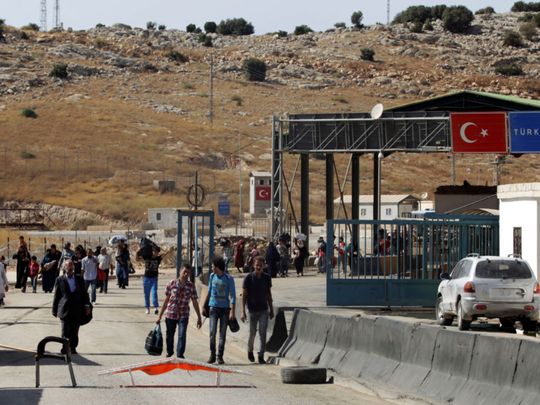
UNITED NATIONS: The UN Security Council voted unanimously on Friday to extend the delivery of humanitarian aid from Turkey to rebel-held northwest Syria for six months with another six months virtually guaranteed after a US-Russia deal, an agreement the UN said will provide lifesaving aid to over 3.4 million people in desperate need of food and other assistance.
The issue of aid to northwest Idlib has been a top priority for the US administration and President Joe Biden raised it at his summit last month with Russian President Vladimir Putin. US Ambassador Linda Thomas-Greenfield travelled to the Bab Al Hawa border crossing in Turkey in early June to spotlight the importance of keeping it open.
Russia’ UN Ambassador Vassily Nebenzia called the vote “a historic moment’’ saying Moscow expects it to become “a turning point’’ for Syria, the Middle East, the world and hopes “that it might be a turning point that is indeed in line with what Putin and Biden discussed in Geneva.” Thomas-Greenfield responded calling it “an important moment in our relationship’’ that shows what can be achieved “if we work with them diplomatically on common goals.’’
The key issue during final negotiations had been whether the council should authorise deliveries through the Bab Al Hawa crossing to northwest Idlib for another year, which the West, UN and humanitarian groups said was critical — or for six months as Russia, Syria’s closest ally, had insisted on. The current one-year mandate for aid through Bab Al Hawa expires on Saturday.
The resolution authorises aid deliveries through Bab Al Hawa for six months until January 10, 2022, with an automatic extension for another six months until July 10, 2022, “subject to the issuance’’ of a “substantive report’’ by UN Secretary-General Antonio Guterres — which is all but certain — on the “transparency’’ of the aid operation and progress on delivering aid across conflict lines within Syria as Russia wanted.
Thomas-Greenfield said the resolution assures that food, clean water, vaccines and medicines, which now enter Idlib on about 1,000 trucks every month through Bab Al Hawa, will continue for a year.
“Thanks to this resolution, millions of Syrians can breathe a sigh of relief tonight knowing that vital humanitarian aid will continue to flow into Idlib through the Bab Al Hawa border crossing after tomorrow, and parents can sleep tonight knowing that for the next 12 months their children will be fed,’’ she said. “The humanitarian agreement we’ve reached here will literally save lives.’’
Nebenzia called the resolution “a milestone on the path to resolving the Syrian crisis and overcoming its consequences’’ and said he was grateful to the Americans and all council members for reaching agreement “in spite of all the difficulties and problems.’’
“The members of the council have given the green light for the cross-border mechanism to be enhanced gradually and then eventually be replaced by cross-line deliveries,’’ he said. “For the first time it addresses the need to improve cross-line deliveries.’’
But humanitarian and human rights organizations including Oxfam, the International Rescue Committee, Human Rights Watch, Amnesty International and Physicians for Human Rights criticized the Security Council for allowing Russia to only allow aid through a single crossing for six months, with a six-month extension subject to conditions.
Russia and some council members said a second resolution might be needed in January though the US, UK and others said another resolution isn’’t necessary.
The Security Council approved four border crossings when aid deliveries began in 2014, three years after the start of the Syrian conflict. But in January 2020, Russia used its veto threat in the council first to limit aid deliveries to two border crossings in the northwest, and then last July to cut the crossings to just Bab Al Hawa.








